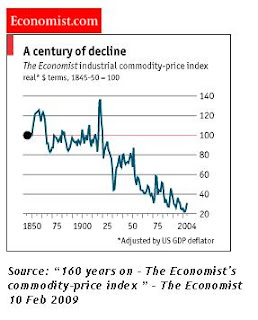Yesterday in Wellington I attended a keynote speech by a Dr Paul Callaghan, the Alan MacDiarmid Professor of Physical Sciences at Victoria University. The presentation was titled “Beyond the Farm and the Theme Park: transforming New Zealand's culture and economy.”
Dr Callaghan delivered fascinating insights into the economics of New Zealand’s future wealth creation possibilities and challenges. Of particular interest was his contention – that if New Zealand aspires to grow its way back to GDP per capita parity with Australia – it will not be through dairy or tourism. It would have to be through high revenue per employee “brain” (high tech) businesses. Below I attach some relevant quotes from a Herald article Dr Callaghan wrote back in February. This article, titled after his book “Wool to Weta” fully articulates the arguments from his keynote yesterday.
“New Zealand exports commodities, but the long-term trend for commodities - as graphed by The Economist - shows localised peaks when times are good, but the overall trend is relentlessly down.
“To match Australia's per-capita prosperity, we would need to lift our GDP by US$30 billion a year. Where might we earn that money?
“Adding US$30 billion per year would mean, on the face of it, multiplying our dairy exports by five, or our tourism by four. . And even if we could increase dairying or tourism, there are problems.
“I doubt that it would be feasible to double Fonterra's production, let alone increase it by a factor of five, and I doubt whether we would want to quadruple the numbers of tourists visiting New Zealand each year, from 2.5 million to 10 million.
“I want to suggest another model for New Zealand export business, and one that has few downsides. looking at largely brain-based business, it does seem, overall, that high-technology companies come out quite well. They consume little energy. They do not emit significant greenhouse gases or dump nitrates in our lakes. The Resource Management Act is no bother to them at all, and, as their products are valuable, they are perfectly happy with a high New Zealand dollar value. And these businesses reside in perfectly attractive buildings and surroundings. In short, they are sustainable, environmentally and socially benign and there is no limit to the numbers of such companies which we might enjoy, except to the degree that our brains and enterprise make such businesses possible.
"Clearly New Zealand would benefit if many more such "knowledge businesses" were to form, but what can we do to seed that process?
THOUGHTS: Dr Callaghan’s logic puts an end to the mantra that the dairy industry and tourism industries are where the weight of R&D investments should go to secure New Zealand’s future prosperity.
KEYWORDS: New Zealand, Growth, Agriculture, Tourism, High-Technolohy, Sustainability


